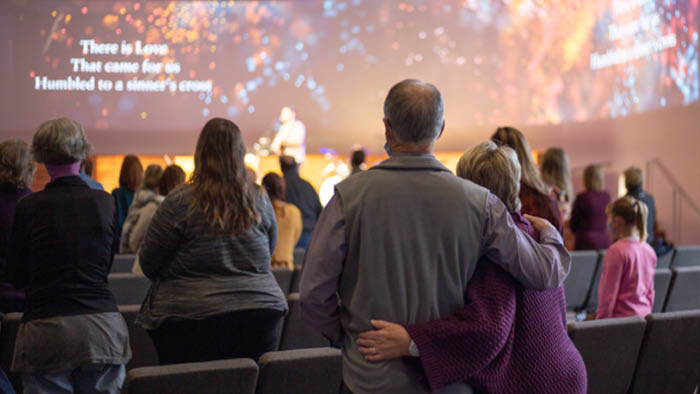
The Transformative Role of Physical Actions in Worship: Surrender, Trust, and Honor with W. David O. Taylor | POD 020
WATCH
LISTEN
RESOURCES
A Body Of Praise – W. David O. Taylor
Open And Unafraid – W. David O. Taylor
Bono & Eugene Peterson | The Psalms – Produced by W. David O. Taylor
HOSTS & GUESTS
W. David O. Taylor – Guest
Bill Gorman – Co-Host
Gabe Coyle – Guest Host
Show Notes
The Transformative Role of Physical Actions in Worship: Surrender, Trust, and Honor
What is the role of our physical bodies in the context of worship? Our guest, W. David O. Taylor, a theologian and author, shares insights from his book A Body of Praise, which explores the various traditions around the incorporation of our bodies while we praise and worship. Join us as we uncover the invitation we have in Christ to bring our wholly integrated selves to our corporate gatherings and how it will impact the way we receive and respond to the gospel of Jesus each week.
THREE KEY TAKEAWAYS:
- The body plays a crucial role in worship: W. David O. Taylor’s book, A Body of Praise, highlights the significance of the physical body in our worship of God. He challenges deficient ideas and practices surrounding the body in worship and invites readers to embrace a biblical vision of bodily life.
- Cultural biases and traumas impact our engagement with our bodies in worship: Taylor emphasizes the influence of cultural biases and personal experiences on our understanding of what it means to embody worship. He discusses how these factors can be damaging and stresses the importance of creating inclusive spaces that honor and welcome those with disabilities.
- Physical acts of worship shape our hearts and minds: The episode delves into the power of physical acts of worship in shaping us to be more Christ-like. Taylor shares personal anecdotes and examples from different traditions to highlight the transformative effect of physical worship. He emphasizes the importance of both spontaneous and prescribed actions, as well as the discipline and freedom that can be found in engaging our bodies in worship.
#WorshipInMotion #EmbodiedFaith #PhysicalActsOfWorship #BridgingTheGap #SilenceAndStillness #ResistingTheNoise #CommunityInWorship #CaughtNotTaught #TheFormedLifePodcast #WDavidTaylor #bono #eugenepeterson
GUEST BIO:
W. David O. Taylor is Associate Professor of Theology and Culture at Fuller Theological Seminary and the author of several books, including A Body of Praise: Understanding the Role of Our Physical Bodies in Worship, Open and Unafraid: The Psalms as a Guide to Life, and Glimpses of the New Creation: Worship and the Formative Power of the Arts. An Anglican priest, he has lectured widely on the arts from Thailand to South Africa. In 2016 he produced a short film on the psalms with Bono and Eugene Peterson. He lives in Austin, Texas, with his artist wife, Phaedra, with whom he produced three sets of illustrated prayer cards: “Prayers of the Psalms,” “Prayers for Life,” and “Prayers for Advent, Christmas and Epiphany.” They have also collaborated on a book of collections and paintings to be published by Intervarsity Press in the spring of 2024, Prayers for the Pilgrimage: A Book of Collects for All of Life.
QUOTES:
“We need to worship our God with our bodies in the same way that a sunflower is constantly turning its face to the sun.”
— W. David O. Taylor
“I think those things can happen when we gather in worship, that the things that we do with our bodies, regardless of our personality, regardless of our emotions at the moment, can rein us to be Christ like or have a true Christ shaped humanity wherever we may find ourselves.”
— W. David O. Taylor
“So you see all throughout history how in Christ, really, every wall that divides us is broken down and broken down most centrally when people gather before the face of their maker in worship.”
— W. David O. Taylor
RESOURCES:
A Body Of Praise – W. David O. Taylor
Open And Unafraid – W. David O. Taylor
Bono & Eugene Peterson | The Psalms – Produced by W. David O. Taylor
CHAPTERS:
02:40 Missionaries influenced by Dallas Theological Seminary tradition
03:44 Thesis on Jesus’ healing significance
12:56 It’s important to worship God with our bodies
14:02 Offering bodies to God in worship is essential
17:25 Body actions enhance spiritual connection and worship
20:57 Sanctify, express integrity, worship, be truly free
26:09 God’s people worshiped together, breaking down barriers
30:13 Practicing silence to be fully present
32:17 Resisting daily distractions, prioritizing focused moments
37:17 Adapting children’s ministry to digital with creativity
38:22 Father and daughter enact Bible stories creatively




